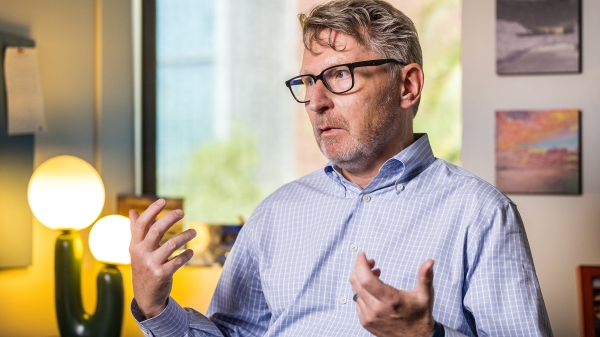ASU's lifelong learning director elected to Academy of Leisure Sciences

ASU Professor Richard Knopf has been elected to the Academy of Leisure Sciences. Photo courtesy ASU
Richard Knopf, an ambassador for lifelong learning who helps guide older adults along paths of continuing knowledge, will be inducted as a fellow of the Academy of Leisure Sciences during ceremonies on Feb. 28.
Knopf has served since 2010 as director of the Osher Lifelong Learning Institute at Arizona State University (commonly referred to as OLLI at ASU) and is a full professor in the ASU School of Community Resources and Development. He is also director of the the school's Partnership for Community Development.
OLLI at ASU and the School of Community Resources and Development are part of the Watts College of Public Service and Community Solutions.
“Rick Knopf’s election to the Academy of Leisure Sciences illustrates the meaningful impact of his scholarship, leadership and service in his field,” said Cynthia Lietz, dean of the Watts College. “His research, mentoring of students and many years of leadership of OLLI at ASU are highly valued by the university and our college. I am so pleased to see his talent and commitment recognized nationally through this prestigious appointment. I’m proud to be able to congratulate him on this well-deserved honor.”
Christine Buzinde, director of the School of Community Resources and Development, also congratulated Knopf, saying his induction into the academy represents a major milestone.
“This induction is aligned with ASU’s goal of establishing national standing in academic quality and impact within colleges and schools,” Buzinde said. “It is a significant reflection of Dr. Knopf’s many accomplishments in scholarship and practice. Inductees elected into the Academy of Leisure Sciences are all recognized for their commitment to advancing the role of leisure sciences and its contributions to enhancing the health and well-being of our communities.”
Knopf said he was thrilled to be honored by the academy, which he said are combined voices for research, advocacy and supporting young scholars. He said leisure, community development and lifelong learning have been the three major focuses of his academic career, and that election to the academy validates his significant contributions to each of these spheres of scholarship.
“By now operating within the context of this honorary academy, I can serve our fields as part of a larger collective striving for a bigger voice — and a larger source of strength — for the advancement of the imperativeness of quality leisure, community efficacy and lifelong learning to enhance quality of life for all,” he said.
Knopf is one of five new fellows entering the academy this year.
Candidates for membership may be nominated only by a current fellow. Daniel Dustin, a professor emeritus of parks, recreation and tourism at the University of Utah, nominated Knopf, while School of Community Resources and Development Professor Kathleen Andereck wrote a support statement to the academy.
Andereck said Knopf was her department chair when she came to ASU at its West campus in 1993. She said Knopf’s election as a fellow pays tribute to his dedication to lifelong learning.
“Rick’s been so successful at taking ASU’s Osher Lifelong Learning Institute to the next level. It’s really a model for the other Osher programs around the country,” Andereck said of the program that offers university-quality, non-credit courses to adults aged 50-plus.
“To me, that really has been such a significant contribution, not just here in the Phoenix area, but much more broadly throughout the globe,” Andereck said. “He’s had such an impact on so many people’s lives. I was just really pleased that enough other people saw how important that contribution was to leisure studies.”
Andereck said Knopf recognizes that once many people retire from challenging careers, they aren’t ready to “give it up.” Instead, they want to be further challenged to learn new things.
“It shows the quality of the offerings when you see that some of our own faculty, when they retired, took classes with OLLI,” she said. “It’s important not only for Rick to be recognized, but to recognize the importance of something like OLLI to older adults and how it contributes to their quality of life.”
Former ASU Provost Mark Searle, a School of Community Resources and Development full professor who is also an academy fellow, praised Knopf’s scholarship as “instrumental in bringing new insights into the role of leisure in the quality of life of older adults."
"His work transcends traditional disciplinary boundaries and examines the lives of older adults to understand the importance of learning, social engagement and leisure pursuits in determining life satisfaction and well-being among those in the third age,” Searle said.
Searle said election as a fellow reflects the impact of Knopf’s work throughout his career.
“One can only be elected by those who are fellows, and this is but a small percentage of scholars in the field,” Searle said. “Such an honor is a reflection on not only Rick but on ASU, which seeks to be recognized for its excellence in scholarship across all disciplines, and importantly in interdisciplinary research that breaks new ground and opens new lines of inquiry.”
Knopf said through his community development work and his time with OLLI at ASU, he has been researching and contributing to what he called the “older adult life space,” helping develop life quality for older adults.
“I approached it from the standpoint of retirement being the ultimate expression of leisure,” he said, “grabbing hold of leisure as the freedom to do whatever you want.”
Research has uncovered that an active and meaningful life is not only achieved through healthy eating and exercise, Knopf said, but through the following:
- Activating the intellect through keeping the mind active through continuous learning.
- Building community, which he said is essential because loneliness is the most powerful predictor of a shortened life span and diminished health as measured across a plethora of biomedical markers.
- Living out a sense of purpose, where life has greater meaning and destiny.
“This, ironically, is the Watts College mission,” Knopf said. “It is orchestrating all these transformations together in unison to serve the public.”
More Arts, humanities and education

How the humanities can prepare students for jobs in any field
As the dean of humanities in The College of Liberal Arts and Sciences at Arizona State University, Jeffrey Cohen knows better…
Postdoctoral scholar joins ASU Jewish studies to teach about Israel, the Middle East
Beginning fall 2024, Adam Hefetz will join the faculty of Arizona State University's School of Historical, Philosophical and…

Humanities Institute hosts Writing Studio to foster community, craft
The myth of the solitary scholar is just that: a myth.To kick off the fall semester, the Humanities Institute at Arizona State…